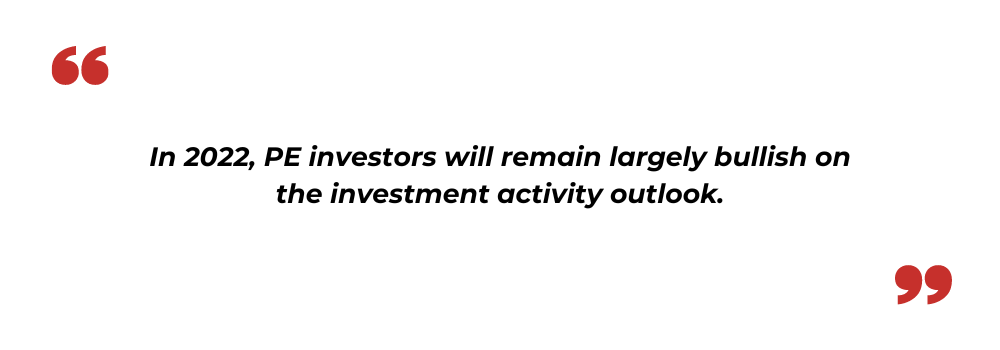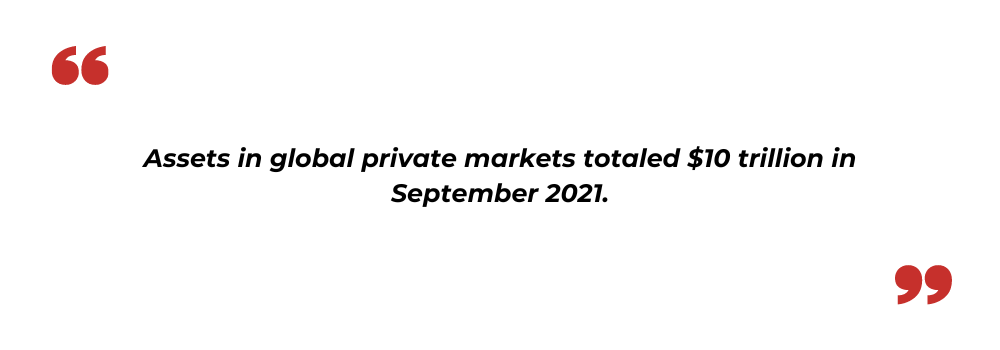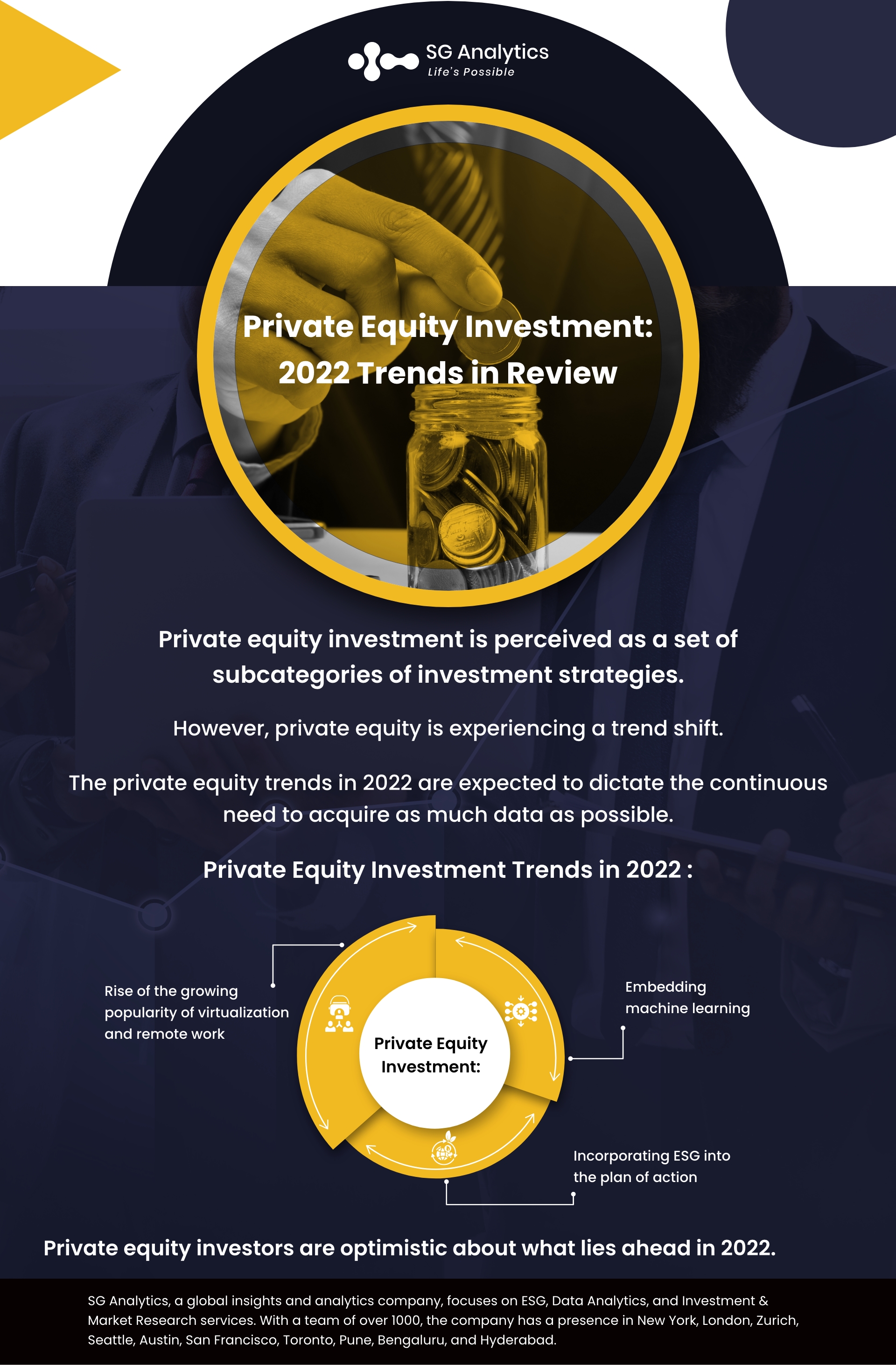The big bucks required for expansion and company growth often come from an initial public offering (IPO) in the stock market. This capital behind organizational growth is a product of private markets. In private equity markets, deep pools of money are used to make deals directly, as they offer a flexible approach to providing the fuel needed.
Companies are now seeking to sell shares or borrow large sums with assistance from private-equity firms, venture capitalists, hedge funds, institutional investors, and fund managers.
The private equity industry, as the name implies, invests in shares of private organizations. This has helped them emerge as a sprawling, high-powered, moneymaking machine in the past few decades. However, data on private equity is scarce as the dealings are often private. However, available numbers offer a clear picture of its enormous scale.

After the uncertainties arising due to the pandemic, PE/VC investments are on an uptrend, and the deal velocity is picking up. In 2021, the Indian Private Equity and Venture Capital (PE/VC) industry concluded with investments of over US$77.1 billion. PE/VC investments in 2021 were reported 62% higher than in 2020. The total worth of global PE investments in 2021 was recorded at around US$1.2 trillion.
Private equity investments have always been perceived as great elements to materialize, especially when exploring alternative ways to finance them. Likewise, the private equity trends in 2022 are expected to dictate the continuous need for PE firms to acquire as much data as possible.
Read more: Creating Value for Climate Change Crisis Through the Lens of Private Equity

The Rise of Private Equity
Today, private equity is perceived as a whole set of subcategories of investment strategies that are connected by a course of raising funds from private investors. Yet, venture capital is still one of its most important strategies. It assists start-ups in going into business and provides them with early development means.
Just like any other industry, private equity is also experiencing a trend shift. Today venture capital firms are primarily interested in tech firms that are shaping the modern way of life.
Investors are now seeking opportunities that exhibit signs of a return value to outweigh any predicted risks. However, with circumstances changing, they are exploring different sectors for new opportunities. These monumental events are expected to shape private equity investment trends in 2022.

Private Equity Investment Trends in 2022
There are many trends that are expected to rise or accelerate in the private equity investment market in 2022. Although private equity firms have gradually joined the digital technology revolution, many are seizing the opportunity and implementing advanced data analytics tools to identify growth opportunities. However, these elements can be majorly summarized under three main central themes that will shape the upcoming shifts in the private equity sector.
With the world coming to terms with the aftermath of the crisis, enterprises are looking to rebuild and move forward. Now, private equity enterprises are getting associated with another crucial strategy for leveraged buyouts. The private equity trends of 2022 will lead organizations on the path to shaping the success of future businesses.
Read more: Global Economic Trends For 2022 and Beyond

-
Embedding Machine Learning
In the last decade, industries have experienced an extreme accumulation of alternative data sources. However, the next decade is likely expected to advance in data analysis technology.
Machine learning as an integral part of artificial intelligence offers organizations opportunities to solve new problems without additional programming. These algorithms enable businesses to develop their problem-solving abilities by constantly operating on the data, ensuring machine learning is a crucial part of the foreseeable future of private equity.
Private equity firms are incorporating machine learning to evaluate their buy-out opportunities in the due diligence process as well as to discover new firms ready for a big investment. They employ machine learning to improve the efficiency of the analysis as automated data-handling procedures are much faster. It additionally offers the ability to improve operations and take work efficiency to a whole new level. Machine learning also lowers the likelihood of errors as no human bias or weariness is involved, leading to cost efficiency.
While all the technical challenges can be met with machine learning, the main opposition PE firms are facing is the human bias against technology. The unwillingness to accept these technological advancements still exists in PE firms. Therefore, those who can understand the benefits of machine learning are now taking it upon themselves to discover ways to reach and educate others about the significance of machine learning and help them stay abreast with the pace of the industry.

-
The Growing Popularity of Virtualization and Remote work
The COVID-19 pandemic compelled many industries to implement remote work strategies at a faster pace. This led to a surge in the rate of virtualization of many private equity procedures. With more and more meetings and decisions taking place online, remote work and virtualization have now become an important part of private equity firms’ daily operations. These strategies have their own considerable benefits.
Virtualization of the workflow has helped enterprises in removing the barriers arising due to geographical distance. It has also reduced unnecessary bureaucracy, as businesses are able to recognize which procedures are nonessential and superfluous. This has led to improved efficiency for PE firms.
However, virtualization has its own drawbacks, the biggest one being the additional bond of trust that is to be developed with the partner, which cannot be easily replicated. One of the main challenges of PE firms is striking the right balance between remote and in-person. Determining which factors are to be relocated to the virtual world and which are to be kept in the real-world interactions will demand a thorough examination of procedures followed by PE firms as well as portfolio companies.
Read more: The Future of Hedge Funds: Top Trends to Watch Out For in 2022

-
Incorporating ESG into the Plan of Action
Evaluating the effects of sustainable investing in the broader ESG context has been a major theme for PE firms. With the significance of this theme growing rapidly, along with climate change and virus outbreaks, enterprises are now exploring ways to tackle this situation. Environmental, social, and governance investing align with this need to consider and incorporate the long-term effects of particular investments. Moving ahead, PE firms are examining portfolio companies by their business qualities and their impacts on society as well as the environment.
ESG investing refers to the stability of societal structures in which sustainable investments are made, and businesses operate. Today, investors are more focused on creating a sustainable environment to build a future with higher reliability. This leads organizations to make better-informed decisions as well as to gain overall control over the future for investors. Investment firms are employing standards of ESG investing in analyzing their possible outcomes. Private equity firms are now working towards handling different data to evaluate investments on many levels.
Key Highlights
-
2021 was documented as a record-breaking year for PE/VC investment industry as it surpassed the trillion-dollar mark.
-
2021 recorded 44 Private Equity (PE) backed IPOs.
-
Strategic exits recorded US$16.9 billion, 39% of all exit deals by value in the year 2021.
-
Secondary exits reached an all-time high of US $14.4 billion in 2021, which in turn accounted for 33% of all exit deals by value.
Read more: Biggest BFSI Trends to Watch out for in 2022

Summary
Durations after serious calamities are always intense. They help strengthen the foundation to rebuild for a better future. After recovering from the serious calamities of the Covid-19 pandemic, investors are marking the beginning of a new period. This new period is expected to bring foreseeable trends in private equity to build a more sustainable future.
However, many are cautious due to the growing inflation and rate hikes that may hamper the unprecedented rate of investment. Due to the elevated investment levels, investors are growing weary of the rising risks, including inflation, ascending interest rates, and high valuations that are likely to put the brakes on the unprecedented pace of transactions. With ESG considerations also taking an increasingly central role in the investment decision, this prevailing theme will likely gain significance in private equity investment.
Going into 2022, PE investors are likely to remain bullish on their investment activity outlook. Private equity and venture capital investors are optimistic about what lies ahead in 2022. Many of them are betting that the rapid pace of investment and fundraising will continue to offer a huge amount of interest in the asset class. 2022 is expected to be an active year for private equity as many investors are preparing to diversify their portfolios.
With a presence in New York, San Francisco, Austin, Seattle, Toronto, London, Zurich, Pune, and Hyderabad, SG Analytics, a pioneer in Research and Analytics, offers tailor-made services to enterprises worldwide.
A leader in the Private Equity space, SG Analytics partners with global companies and assists them in acquiring and realizing strategic value from their investments. Contact us today if you are in search of an investment research firm to leverage custom research support across a broad range of asset classes and enhance your investment decisions.









